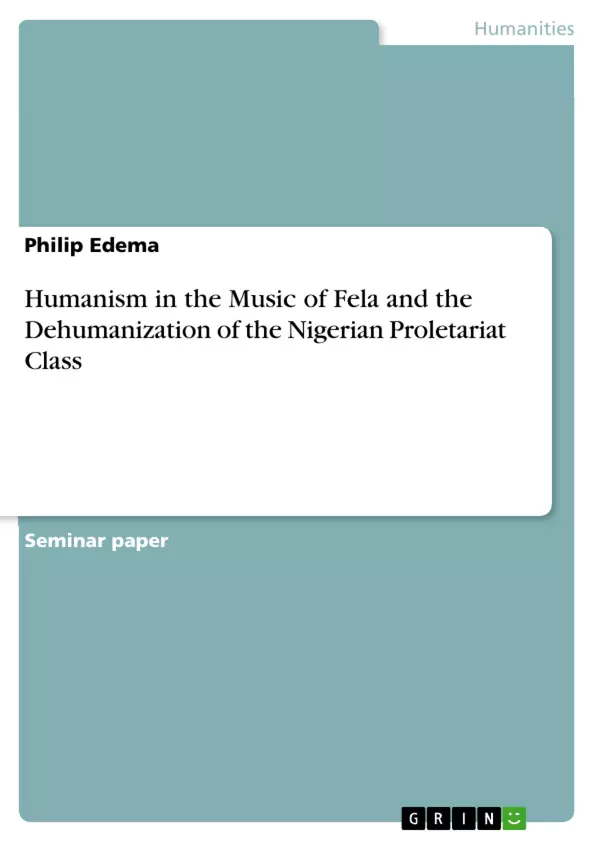It is an indisputable fact that the myriad of problems in Nigeria today in the areas of politics, religion, security and economy are a reflection of dearth of good governance. There have been conceited efforts by pundits on means that could bring about a viable polity yet to no avail. The liberals have called for restructuring, while the radicals believe it is outright dissolution of the Union that can ameliorate the pauperisation, exploitation and crass dehumanisation of the citizenry. However, these suggestions have not addressed the trajectory of the problem, thereby, making them limited in addressing the issues.
This paper, therefore, examines the contributions of the famous Nigerian Afrobeat music maestro, Fela Anikulapo Kuti, especially as it concerns the dehumanisation of the proletariat class by the elites in Nigeria. The song, "Teacher Don’t Teach Me Nonsense" among others in Fela’s musical repertoire, was purposefully selected to interrogate the problematic. More so, the research adopted the hermeneutic, analytic, critical and reconstructive methods of philosophy in achieving its aim. While the method of hermeneutics helped in decoding and applying the deeply embedded messages in Fela’s music, the analytic method aided in clarifying concepts like humanism, governance, exploitation, dehumanisation, and oppression. The critical method was employed to examine hitherto attempts on same issue and finally the method of reconstruction helped to situate Fela’s relevance and efforts in addressing the issue of dearth of good governance in Nigeria. The work concluded that it is only when the political leadership responds to Fela’s call for class deconstruction would Nigeria witness the kind of governance that would transform the quality of lives of the citizenry.
Inhaltsverzeichnis (Table of Contents)
- INTRODUCTION
- CONCEPTUAL CLARIFICATION
- Humanism
- Governance
- GOVERNANCE AND FELA'S HUMANISM
Zielsetzung und Themenschwerpunkte (Objectives and Key Themes)
This paper examines the contributions of Fela Anikulapo Kuti, particularly as they relate to the dehumanization of the proletariat class in Nigeria. The research aims to understand how Fela's music, particularly the song "Teacher Don't Teach Me Nonsense," critiques the problematic relationship between the elite and the masses. The study utilizes hermeneutic, analytic, critical, and reconstructive methods of philosophy to achieve its objectives.
- Fela's Humanist Philosophy and its Critique of Governance in Nigeria
- The Dehumanization of the Proletariat Class by the Elites
- The Role of Music as a Tool for Social Commentary and Change
- The Need for Purposeful Leadership and Good Governance in Nigeria
- The Significance of Fela's Work in Addressing the Crisis of Governance
Zusammenfassung der Kapitel (Chapter Summaries)
- INTRODUCTION: This chapter introduces the topic of the crisis of governance in Nigeria and how Fela's music provided a critical commentary on the issue. It highlights the pervasive problems of corruption, electoral fraud, insecurity, and economic instability plaguing the country. Fela's activism and his humanist philosophy are presented as potential solutions to these challenges.
- CONCEPTUAL CLARIFICATION: This chapter delves into the core concepts of humanism and governance. It explores the concept of ethical humanism, drawing upon the traditional African values of community and togetherness. The chapter also examines the concept of governance, highlighting its diverse dimensions, including political, economic, and corporate governance.
Schlüsselwörter (Keywords)
The core keywords and focus topics of this text are: Governance, Humanism, Oppression, Exploitation, and Dehumanization. These terms reflect the primary themes and concepts explored in the paper, particularly Fela's critique of Nigerian governance and its impact on the people.
- Citar trabajo
- Philip Edema (Autor), 2023, Humanism in the Music of Fela and the Dehumanization of the Nigerian Proletariat Class, Múnich, GRIN Verlag, https://www.grin.com/document/1396657



